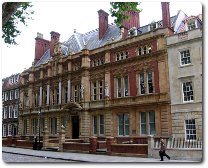Persuasion Contents
- Social / political context
- Religious / philosophical context
- Literary context
- Volume 1
- Volume 2
Volume 1, Chapter 6
Synopsis of Volume 1, Chapter 6
Anne's visit to Uppercross gives her a new set of people and concerns to which she has to adjust. The Musgroves are wrapped up in their own matters, but Anne resolves to become familiar with them and thus find her place in their company. Mary does not treat Anne with as much disregard as Elizabeth does, and is preferable to be with. Charles, while somewhat boring and rather lazy, poses no threat to Anne. Other than finding herself in the awkward position of go-between, Anne is happier for the change of location.
The Crofts move into Kellynch Hall and Anne is introduced to them. The Crofts mention Captain Wentworth, and the Musgroves realise he is the same captain who showed undue kindness to their unhappy son Dick before his death. They are eager to see him again, and Anne prepares herself for the inevitable meeting.
Commentary on Volume 1, Chapter 6
the art of knowing our own nothingness beyond our own circle Anne is used to being marginalised in her own home, and now that feeling is further intensified as she finds that she is peripheral in other societies, too.
 none of your Queen-squares for us Queen Square is a square of Georgian houses designed by the architect John Wood, the elder. Jane Austen had stayed there in 1779, and would have known it to be one of his first developments, and therefore rather unfashionable.
none of your Queen-squares for us Queen Square is a square of Georgian houses designed by the architect John Wood, the elder. Jane Austen had stayed there in 1779, and would have known it to be one of his first developments, and therefore rather unfashionable.
repulsive An archaic use of the word, meaning cold and unfriendly.
lose her place Mary does not want to be on such familiar terms with the Musgroves that they forget to recognise her social precedence at dinners etc.
electrified A metaphor typically used in Romantic literature. Jane Austen usually avoids using such strong, overstated language.
with proper interest Anne's agitation has distracted her. Throughout the following events she will struggle to prevent her emotions from affecting her responses.
midshipmen Apprentice officers similar in rank and responsibility to petty officers in today's Royal Navy.
- Despite the fact that the Elliots and Musgroves have intermarried and seem to enjoy one another's company, they are from distinctly different classes. What are the differences in the activities each family engages in?
- What is Anne's response to these differences?
- The Crofts can be seen as representing both the navy and the upward mobility of the professional classes. What do you notice about how Mrs. Croft is described?
- How does our perception of her affect our perception of the navy?
- Nothing complimentary is said about Charles' and Mary's children. What role has their parenting played in this?
- Are both parents equally at fault?
- What does it say about Anne that she is better at managing them?
- Notice how Jane Austen's introduction to - and description of - poor Richard is shockingly harsh. What might be her reasons for such complete condemnation of him?